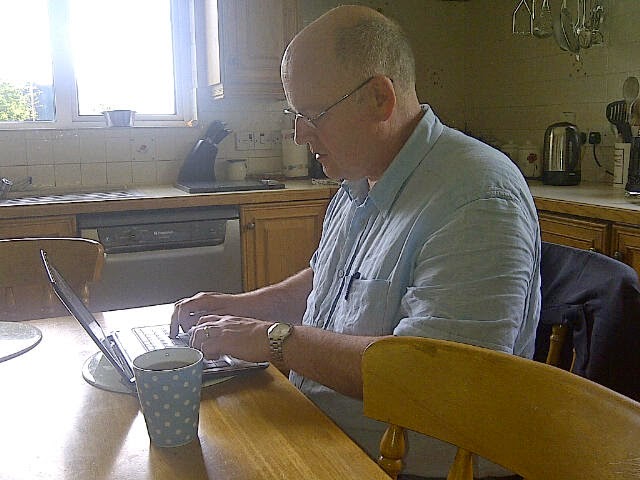Picture
the scene: a brilliantly sunny, swelteringly hot morning in Derry, the kind of
day which used to melt the tar on the roads and which now throws packs of
rain-proofed, wind-cheating, ‘Troubles’-chasing foreign tourists into a state
of brow-wrinkled confusion.
Walking
down through the Bogside, towards the city’s historic old walls, I’m lost in
thought, wondering whether I’ll be on time for the 11.10 train to Coleraine in
half an hour’s time. Suddenly my reverie is disturbed by a guttural bellow from
the front passenger window of a passing car: ‘W--ker!’
The
force of the bawl – clearly audible above the traffic din – startled me (for
one dreadful moment I thought he had called me a banker!); then its import
struck home. ‘W--ker’? If the cap fits, wear it, I suppose.
I turned
around to see precisely where the insult had come from and to ascertain whether
it had, indeed, been meant for me. Other passers-by were also pirouetting,
presumably trying to determine whether they, too, might have been the intended
target.
A cheery
young workman, unloading tools from the back of a van in an adjoining car park,
put us all out of our misery. With a smile as bright as the glorious morning
and a wave as wide as the azure blue sky, he signalled his recognition of the
verbal assailant, replying, with Libran eloquence: ‘W--ker!’
It
struck me that these were not insults, but some manner of greeting. I am still
not sure whether, in this context, the term constituted a noun or an adjective.
Quite
what the inquisitive foreigners might have made of it – if they flicked through
their phrasebooks to the ‘W’ section – I don’t know. Perhaps, in the
not-too-distant future, sophisticated Europeans, eager to show off their
mastery of ‘native’ English, will seek to impress friends and acquaintances by
hailing them with this new salutation, acquired in the UK’s City of
Culture-in-waiting, no less: ‘W--ker!’
God
forbid that the practice should catch on; I shudder to think of Signor
Berlusconi’s next encounter with Mr Cameron.
The Bogside
exchange troubled me. For the record, I am no shrinking violet when it comes to
rude words: my own vocabulary has expanded over the years to include many
“colourful” verbs and adjectives, and has now settled somewhere between the
blunt speaking of racing pundit Ted Walsh and the coarse invective of Father
Jack Hackett. One certainly could not describe my speech as ‘feck-less’.
But,
there is a time and a place for everything, and I would suggest that late
morning, on a busy main road in the Bogside, is neither the time nor the place
for hollering out the ‘W-word’. Not in front of the children. And certainly never
in front of the foreigners!
Language
is, of course, an organic thing: living, breathing, growing, shedding. Earthy
words have had a place in even the most eminent literature, since Chaucer’s
time and before. ‘C’est la vie,’ as we say, nowadays, in urbane, multi-cultural
Derry.
I cannot
imagine, though, that the man who hollered from that passing car had somehow
been moved by the muse, or considered that he was following in the footsteps of
Chaucer, Shakespeare or even Joyce.
Vulgar
language has become so common, nowadays, that it no longer shocks many of us;
that is what I find shocking. Boundaries have not simply been blurred, they
have become invisible. Expletives – the ‘F’ word, the ‘B’ word, the ‘C’ word,
the ‘A’ word, the ‘D’ word, even what Mrs Doyle called ‘the bad “F” word –
worse than Feck’ – are woven into everyday speech and many of us hardly even
notice.
Just in
case I’m accused of disloyalty, I should point out that such profanity isn’t
confined to my native city; the same raunchy lingo can be heard the length and
breadth of Ireland, from Bastardstown to Muff, from Cockhill to Ringaskiddy.
The
actor, Stephen Rea, reminded a Derry audience recently of an observation
made many years ago by the distinguished playwright Brian Friel: “It’s all
about language, you know.”
The word
profanity comes from the Latin term ‘profanus’ – meaning ‘outside the temple’.
And as I climb the hill towards the magnificently restored First Derry
Presbyterian Church, which looks down on the Bogside from the old walls above,
it occurs to me: wouldn’t it be fitting if, during the Year of Culture, local
citizens were to lead a fight-back against swearing. Now that would be a
handsome legacy.
'Que será será,' as we say in cosmopolitan Derry.
